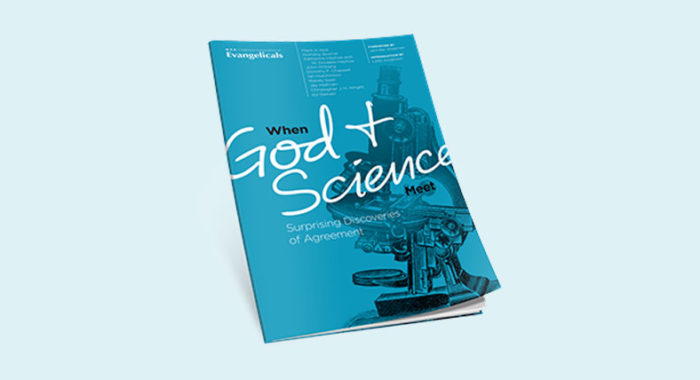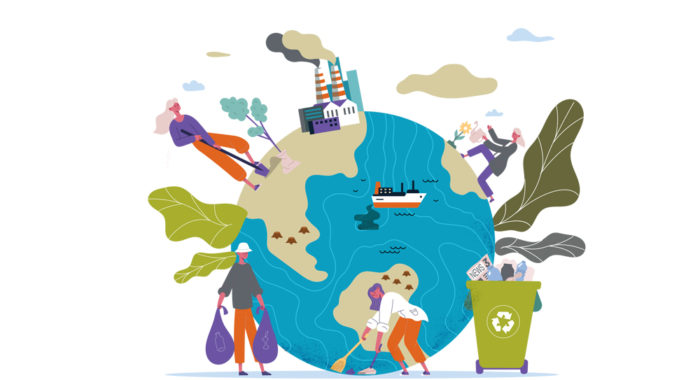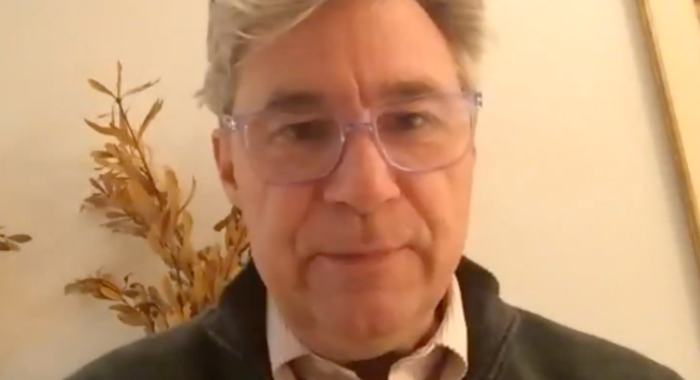Evangelicals look to the Bible for guidance in all areas of life. What can the Bible say to us in this world where pollution, heat waves, floods and droughts are frequent? The Bible does not tell us anything directly about how to evaluate scientific reports or how to respond to a changing environment, but it does give several helpful principles: Care for creation, love our neighbors and witness to the world.
Love God, Care for Creation
One of the best places to start is with Jesus’ summary of the Old Testament:
“Teacher, which is the greatest commandment in the Law?” Jesus replied: “‘Love the Lord your God with all your heart and with all your soul and with all your mind.’ This is the first and greatest commandment. And the second is like it: ‘Love your neighbor as yourself.’ All the Law and the Prophets hang on these two commandments” (Matthew 22:36–40).
For evangelicals, loving God means spending time in worship and prayer. This is foundational. And there is another way to express our love for God. Jesus tells us: “If you love me, keep my commands” (John 14:15).
Loving God means obeying. This includes caring about what happens to God’s creation, because God cares about it and because God gave us the job of caring for it. We worship God by caring for creation. We don’t worship creation. God created the world for his glory:
LORD, our Lord, how majestic is your name in all the earth! You have set your glory
in the heavens (Psalm 8:1; see also Psalm 19).
God gave humans a special place in that creation, as we can see in the same passage: “You made them rulers over the works of your hands; you put everything under their feet” (Psalm 8:6).
Stewardship and Reconciliation
The term “stewardship” is often used to describe our relationship to the Church and the gifts of our time, talent and treasure. This term is also used to describe human care and use of God’s creation. We are like the servants in the parable of the talents (see Matthew 25:14–30). John Calvin understood the concept of stewardship:
Let him who possesses a field, so partake of its yearly fruits, that he may not suffer the ground to be injured by his negligence; but let him endeavor to hand it down to posterity as he received it, or even better cultivated. Let him so feed on its fruits that he neither dissipates it by luxury, nor permits it to be marred by neglect. Moreover, let everyone regard himself as the steward of God in all things which he possesses. [1]
In 2015, the National Association of Evangelicals issued a resolution on caring for God’s creation, which includes the following:
In solidarity with evangelical leaders from around the world, we endorse the creation care principles outlined in the Lausanne Cape Town Commitment, which states:
All human beings are to be stewards of the rich abundance of God’s good creation. We are authorized to exercise godly dominion in using it for the sake of human welfare and needs. … As we do so, we are also commanded to care for the earth and all its creatures, because the earth belongs to God, not to us. We do this for the sake of the Lord Jesus Christ who is the creator, owner, sustainer, redeemer and heir of all creation. [2]
The earth brings glory to God, and God continues to care for and sustain the natural processes of the world. The psalmist says: “Praise the LORD, all his works everywhere in his dominion. Praise the LORD, my soul” (Psalm 103:22). Because God’s glory is revealed in creation, we should be intentional about caring for his artistry.
In addition to “stewardship” as a description of our care for creation, the term “reconciliation” also applies. Because of human sin (see Genesis 3:17–19), our relationships are broken with God, each other, ourselves and the rest of creation. God has a plan to reconcile “all things” as it says in Colossians 1:19–20:
For God was pleased to have all his fullness dwell in him, and through him to reconcile to himself all things, whether things on earth or things in heaven, by making peace through his blood, shed on the cross.
We are a part of that reconciling work. Promoting stewardship and reconciliation calls us to plan ahead and to use our God-given gifts, abilities and natural resources to care for this world in a way that honors God’s plan to reconcile all things to himself. In today’s reality, that includes considering the way our environment is changing.
God’s Sovereignty
While it may be tempting, it is unwise to assume that God would prevent us from drastically harming the earth. God is sovereign, yet he allows us to experience the natural outcomes of our actions. God lets us make poor decisions about our household budgets. He allows us to eat poorly or abuse our bodies with drugs. Likewise, even though God cares and provides for the creatures of the earth, humans have the freedom to make decisions that harm even the basic functions of ecosystems, such as polluting the oceans and deliberately or carelessly setting forest fires. God does not always shield us from the consequences of our actions in other areas of our lives, and we should not assume that he will do so when we are unfaithful stewards of the earth.
Love God, Love Your Neighbor
In Matthew 22:39, Jesus gave us a second command: “Love your neighbor as yourself.” For us to be faithful in loving God, we must love our neighbor. In Luke’s account of the same incident, a bystander asks, “But who is my neighbor?” thus setting the stage for one of the best-known of all Jesus’ parables: the story of the Good Samaritan. “Loving my neighbor,” according to the parable, includes responding to the needs of someone who has been hurt. We are to feed him, clothe him, care for his wounds and provide for him.
Care for people who are poor or oppressed is a resounding theme in both the Old and New Testaments, as, for example, in Deuteronomy 15:10–11:
Give generously to them and do so without a grudging heart; then because of this the LORD your God will bless you in all your work and in everything you put your hand to. There will always be poor people in the land. Therefore, I command you to be open- handed toward your fellow Israelites who are poor and needy in your land.
God gave the Israelites structures and rules that established provision for the poor. Relatives were to redeem sold land and support widows; cloaks could not be kept in pledge; poor people could glean in the fields. We are told to care for those who are hungry and thirsty, even if they are our enemies (see Proverbs 25:21–22; Romans 12:20).
Nothing could be clearer than Jesus’ words in Matthew 25:36–46. Jesus tells his disciples that on Judgment Day, we will stand before God and answer for the way we treated those who were hungry, naked and sick, and for those who were strangers and prisoners: “Truly I tell you, whatever you did for one of the least of these brothers and sisters of mine, you did for me” (25: 40). And, on the other hand, Jesus says, “Truly I tell you, whatever you did not do for one of the least of these, you did not do for me” (25:45). When we care for those who have little, we are ministering to Jesus himself: To care for the weakest is to care for Christ.
As followers of Jesus, we need to respond to the suffering of those most directly affected by the degradation of God’s creation. In coming sections, we will see how climate change interacts with other challenges people face. We will also learn about solutions that combine relief, development, poverty alleviation and creation care.
Love God, Witness to the World
Spreading the good news is a high priority for evangelicals, and rightly so. Jesus said, “Therefore go and make disciples of all nations, baptizing them in the name of the Father and of the Son and of the Holy Spirit, and teaching them to obey everything I have commanded you” (Matthew 28:19–20).
The Lausanne Movement was founded in 1974 by evangelicals such as Billy Graham and John Stott to “unite all evangelicals in the common task of the total evangelization of the world.” [3] In 2010, the Lausanne Congress on World Evangelization developed The Cape Town Commitment, which offers three basic principles: Human beings are lost; the gospel is good news; and the Church’s mission goes on.
The Cape Town Commitment also recognizes that our care of creation affects our witness to the world. The document states:
The earth is created, sustained and redeemed by Christ. We cannot claim to love God while abusing what belongs to Christ by right of creation, redemption and inheritance. We care for the earth and responsibly use its abundant resources, not according to the rationale of the secular world, but for the Lord’s sake. If Jesus is Lord of all the earth, we cannot separate our relationship to Christ from how we act in relation to the earth. For to proclaim the gospel that says “Jesus is Lord” is to proclaim the gospel that includes the earth, since Christ’s lordship is over all creation. Creation care is thus a gospel issue within the lordship of Christ [4] (emphasis added).
The document continues with a description of what mission looks like when creation care is included, saying:
We support Christians whose particular missional calling is to environmental advocacy and action, as well as those committed to godly fulfillment of the mandate to provide for human welfare and needs by exercising responsible dominion and stewardship. The Bible declares God’s redemptive purpose for creation itself. Integral mission means discerning, proclaiming, and living out the biblical truth that the gospel is God’s good news, through the cross and resurrection of Jesus Christ, for individual persons, and for society, and for creation. All three are broken and suffering because of sin; all three are included in the redeeming love and mission of God; all three must be part of the comprehensive mission of God’s people.
Moved by God’s love for the vulnerable, evangelicals are quick to give when disaster strikes. In 2017, after hurricanes Harvey and Irma pounded coasts from Florida to Texas, Christian relief organizations provided more aid than FEMA, the federal agency charged with disaster recovery in the United States. Churches provided food. Convoys of trucks brought necessities. Samaritan’s Purse, a Christian aid organization, arrived with chainsaws and hammers to clear trees and patch roofs. Methodists helped people navigate government aid forms, and evangelicals of many other affiliations cheerfully joined in the tasks. [5]
People need to see not only our witness in relief efforts after a disaster but also that we understand what causes natural disasters to be so terrible. They need to see not only that we will clean up after the disaster but also that, whenever possible, we will help prevent situations that displace millions.
Many Christian development organizations include restorative environmental actions such as forestation in their anti-poverty efforts. Planting crops and trees that can tolerate drought, salt, heat and flooding will continue to be a critical part of lowering greenhouse gas emissions. More of these programs are needed. In the next section, we’ll discover how changes in the environment are threat multipliers for people who experience poverty around the world. Recognizing and addressing this reality will strengthen our witness.
[1] J. Calvin, orig. 1554, Commentary on Genesis, vol 1, part 5, ed. J. King (The Banner of Truth Trust), 125, https://archive.org/details/commentaryongene0000calv/page/n105/mode/2up?q=%22which+he+possesses%22 (accessed 2022-07-22).
[2] “Caring for God’s Creation: A Call to Action,” National Association of Evangelicals, October 15, 2015, https://www.nae.org/updates/caring-for-gods-creation/ (accessed 2022-05-28).
[3] “The Lausanne Movement’s Unique Calling,” Lausanne Movement, https://lausanne.org/about-the-movement (accessed 2022-06-16).
[4] “The Cape Town Commitment: A Confession of Faith and a Call for Action,” section 1, part 7, A Lausanne Movement, 2010, https://lausanne.org/content/ctc/ctcommitment#p1-7 (accessed 2022-05-29).
[5] Paul Singer, “Faith Groups Provide the Bulk of Disaster Recovery, in Coordination With FEMA,” USA Today, September 10, 2017, https://www.usatoday.com/story/news/politics/2017/09/10/hurricane-irma-faith-groups-provide-bulk-disaster-recovery-coordination-fema/651007001/ (accessed 2022-05-29).
Dorothy Boorse serves as professor of biology at Gordon College. Her primary research interests are in aquatic community ecology and invasive species. Boorse also spends a great deal of time studying the integration of faith and science, particularly in the realm of environmental ethics. She holds a master’s degree in entomology from Cornell University and a Ph.D. in oceanography and limnology from the University of Wisconsin-Madison.




 View All Articles
View All Articles 




